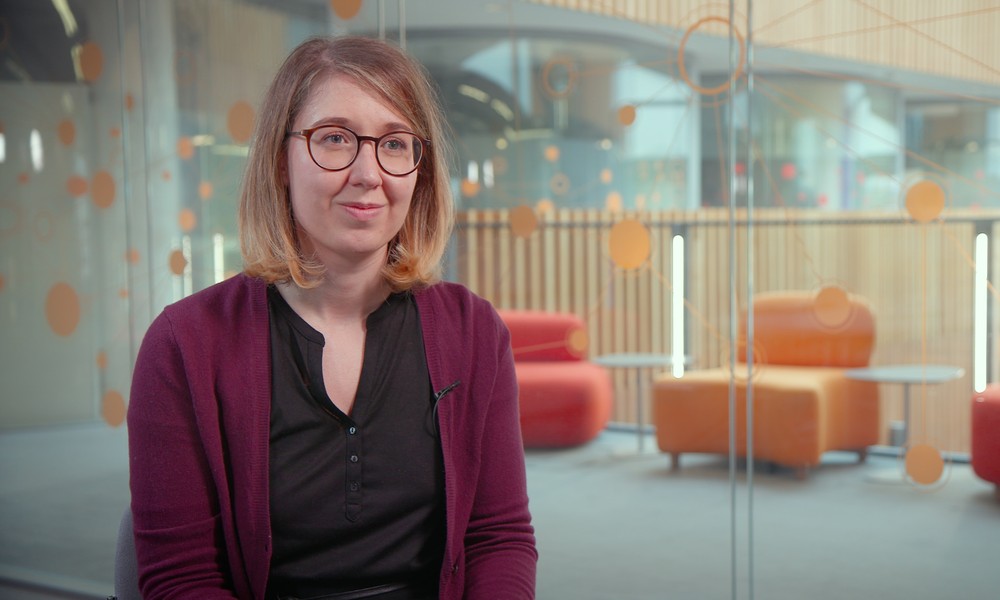
Molecules to Ecosystems: Virginie Uhlmann on the Theory transversal theme
Virginie Uhlmann sheds light on Theory@EMBL, an emergent research area in EMBL’s new programme.

As part of the ‘Molecules to Ecosystems’ Programme, EMBL aims to establish a new research direction, which will use theory-guided paths to conceptualise and understand the underlying principles of biological systems at all scales. The development of novel theoretical frameworks will be an integral part of EMBL’s future research and will integrate approaches from other fields – such as physics, mathematics, and computer science – to solve challenging biological problems.
Virginie Uhlmann, Research Group Leader at EMBL-EBI, is one of the co-chairs of the Theory@EMBL transversal theme, along with two other EMBL group leaders, Alexander Aulehla and Wolfgang Huber. Here, she explores how the theme will open up new research avenues.
What is the Theory@EMBL transversal theme all about?
The main idea is to bring more theoretical biology research to EMBL. Historically, our approach has been to do an experiment, acquire data, then design computational tools to analyse the data. Theory@EMBL promotes a complementary approach: explore a biological question by first coming up with an abstract model, and then design experiments to verify if this model is correct.
Why is this theory-first approach important?
With so much data and so many tools for making perturbations in laboratory models, it’s really easy to become overwhelmed by information. By trying to abstract the problem we’re interested in first, and coming up with theoretical models, we can narrow down the type of data or experiments we want to focus on. This is a different, complementary approach to ‘data-first’ research methods.
At EMBL we already have groups pursuing research with this approach. For example, Anna Erzberger’s group is using concepts of theoretical physics to identify fundamental principles underlying the formation of cellular and multicellular structures, and Alexander Aulehla’s group is using synchronisation theory as a framework to study gene regulation during embryogenesis.
With the new EMBL programme underway, what do you hope to achieve within the Theory@EMBL theme in the next 24 months?
In the first instance, Theory@EMBL aims to bring researchers in theoretical biology to EMBL, building up a critical mass of people with expertise in this field to interact with the experimentalists and computational biologists already in the organisation. This would help build strong links between theory and all the other research areas of EMBL.
One of our most recent recruits, Alejandro Torres-Sánchez, will start his group at EMBL in December 2022, and will employ methods from theoretical physics and computational engineering to develop mathematical models and computer simulations to identify the physical principles guiding the self-organisation and shaping of tissues. Further, we have recently launched a recruitment call for group leaders interested in building new conceptual and theoretical frameworks for biology. We are also running a sabbatical programme, which supports theoretical researchers from other institutions to come and work at EMBL on a collaborative project with an EMBL lab.
With theoreticians embedded within the EMBL research units, we expect to gradually see more discussions and interest in experimental groups about the potential of theory. It will maybe require a bit of a change of mindset in how we explore biological questions, so that we incorporate more conceptual frameworks early on.
What do you think is the most exciting thing about the ‘Molecules to Ecosystems’ programme?
The fact that it goes beyond the molecular scale that EMBL’s primary expertise lies in. If we can connect our molecular expertise to a multiscale approach to life on earth, going up to ecosystems, this really has the potential to draw out some exciting collaborations, discoveries, and applications.
What is the best advice you ever got?
In French, it’s “toujours te trouver là où tu veux être” – always be where you really want to be; follow your gut. One of my mentors told me this in the third year of my undergraduate degree, when I was faced with a tough decision. It is good to rationalise (and we scientists are dangerously good at it), but it is equally important to pay attention to how we spontaneously feel about things, and try and understand why we do so.
Find out more
Learn more about the new EMBL Molecules to Ecosystems Programme and the Theory@EMBL transversal theme.


